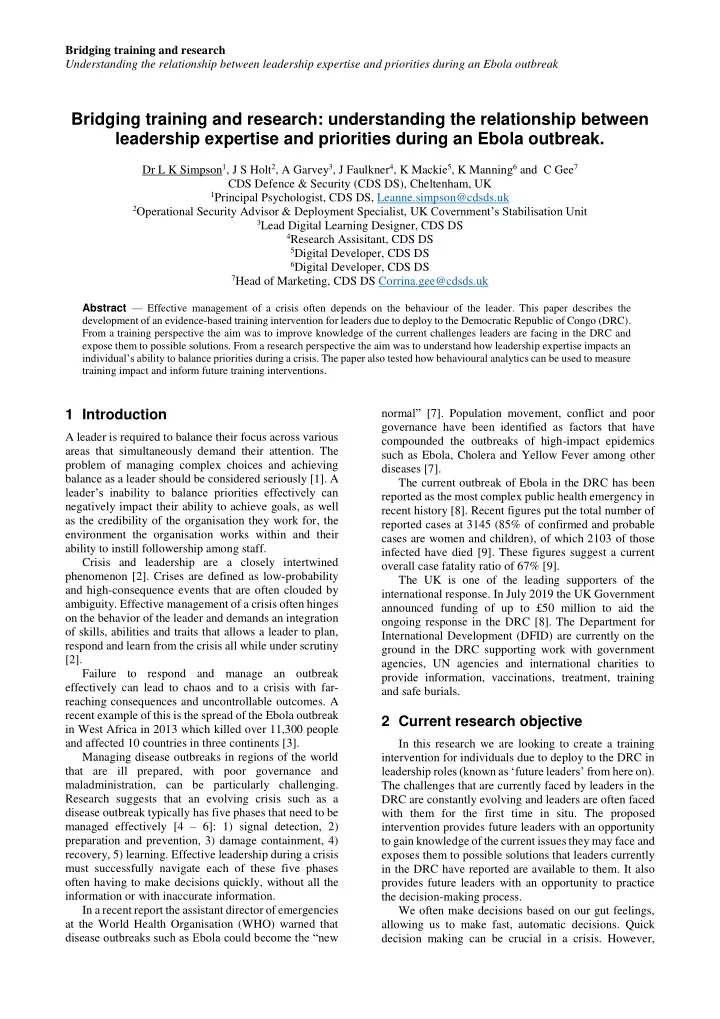

Bridging training and research Understanding the relationship between leadership expertise and priorities during an Ebola outbreak Bridging training and research: understanding the relationship between leadership expertise and priorities during an Ebola outbreak. Dr L K Simpson 1 , J S Holt 2 , A Garvey 3 , J Faulkner 4 , K Mackie 5 , K Manning 6 and C Gee 7 CDS Defence & Security (CDS DS), Cheltenham, UK 1 Principal Psychologist, CDS DS, Leanne.simpson@cdsds.uk 2 Operational Security Advisor & Deployment Specialist, UK Covernment’s Stabilisation Unit 3 Lead Digital Learning Designer, CDS DS 4 Research Assisitant, CDS DS 5 Digital Developer, CDS DS 6 Digital Developer, CDS DS 7 Head of Marketing, CDS DS Corrina.gee@cdsds.uk Abstract — Effective management of a crisis often depends on the behaviour of the leader. This paper describes the development of an evidence-based training intervention for leaders due to deploy to the Democratic Republic of Congo (DRC). From a training perspective the aim was to improve knowledge of the current challenges leaders are facing in the DRC and expose them to possible solutions. From a research perspective the aim was to understand how leadership expertise impacts an individual’s ability to balance priorities during a crisis. The paper also tested how behavioural analytics can be used to measure training impact and inform future training interventions. normal” [7]. Population movement, conflict and poor 1 Introduction governance have been identified as factors that have A leader is required to balance their focus across various compounded the outbreaks of high-impact epidemics areas that simultaneously demand their attention. The such as Ebola, Cholera and Yellow Fever among other problem of managing complex choices and achieving diseases [7]. balance as a leader should be considered seriously [1]. A The current outbreak of Ebola in the DRC has been leader’s inability to balance priorities effectively can reported as the most complex public health emergency in negatively impact their ability to achieve goals, as well recent history [8]. Recent figures put the total number of as the credibility of the organisation they work for, the reported cases at 3145 (85% of confirmed and probable environment the organisation works within and their cases are women and children), of which 2103 of those ability to instill followership among staff. infected have died [9]. These figures suggest a current Crisis and leadership are a closely intertwined overall case fatality ratio of 67% [9]. phenomenon [2]. Crises are defined as low-probability The UK is one of the leading supporters of the and high-consequence events that are often clouded by international response. In July 2019 the UK Government ambiguity. Effective management of a crisis often hinges announced funding of up to £50 million to aid the on the behavior of the leader and demands an integration ongoing response in the DRC [8]. The Department for of skills, abilities and traits that allows a leader to plan, International Development (DFID) are currently on the respond and learn from the crisis all while under scrutiny ground in the DRC supporting work with government [2]. agencies, UN agencies and international charities to Failure to respond and manage an outbreak provide information, vaccinations, treatment, training effectively can lead to chaos and to a crisis with far- and safe burials. reaching consequences and uncontrollable outcomes. A recent example of this is the spread of the Ebola outbreak 2 Current research objective in West Africa in 2013 which killed over 11,300 people and affected 10 countries in three continents [3]. In this research we are looking to create a training Managing disease outbreaks in regions of the world intervention for individuals due to deploy to the DRC in leadership roles (known as ‘future leaders’ from here on). that are ill prepared, with poor governance and maladministration, can be particularly challenging. The challenges that are currently faced by leaders in the Research suggests that an evolving crisis such as a DRC are constantly evolving and leaders are often faced disease outbreak typically has five phases that need to be with them for the first time in situ. The proposed managed effectively [4 – 6]: 1) signal detection, 2) intervention provides future leaders with an opportunity preparation and prevention, 3) damage containment, 4) to gain knowledge of the current issues they may face and recovery, 5) learning. Effective leadership during a crisis exposes them to possible solutions that leaders currently must successfully navigate each of these five phases in the DRC have reported are available to them. It also often having to make decisions quickly, without all the provides future leaders with an opportunity to practice information or with inaccurate information. the decision-making process. In a recent report the assistant director of emergencies We often make decisions based on our gut feelings, at the World Health Organisation (WHO) warned that allowing us to make fast, automatic decisions. Quick disease outbreaks such as Ebola could become the “new decision making can be crucial in a crisis. However,
Recommend
More recommend